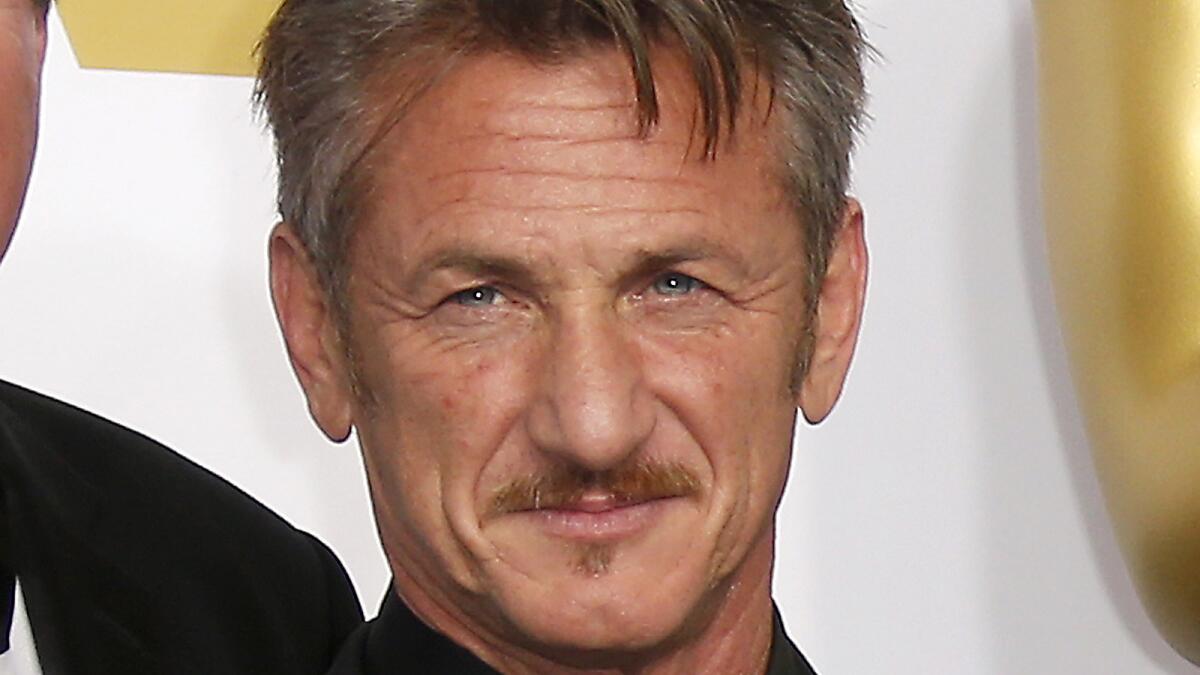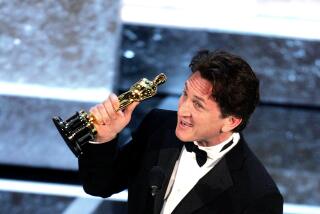For Sean Penn, El Chapo meeting is the latest turn in a complex career

Sean Penn is not only a famous actor, but a culture-wars flashpoint.
- Share via
Sean Penn hasn’t been in a blockbuster thriller in more than a decade, not since his turn as a tormented father in “Mystic River” 12 years ago.
But that movie was known for its third-act twist, and Penn on Saturday provided a career version of his own. After spending years deep in Haiti activism, he materialized from out of nowhere on the website of Rolling Stone with an epic tale of interviewing one of the most wanted men in the world, at the time he was most wanted. Friday’s news story about the capture of drug kingpin Joaquin “El Chapo” Guzman, already a fulcrum for extravagant tales and conspiracy theories, suddenly became a whole new level of wild.
The drama in the piece was fodder enough: coded messages sent via El Chapo emissaries, secret plane rides over unknown topography, covert conversations at jungle hideaways — all enhanced by the fact that the man orchestrating it all was a famous actor. When said actor devised a plan to hide in a trunk and sneak into Mexico, you could be forgiven for thinking that someone had accidentally swapped in a movie treatment where Rolling Stone normally runs articles.
But Penn is, of course, also more than a famous actor. He’s a culture-wars flashpoint, a polarizing force in a polarized age. However you feel about him, you’ve probably felt for a long time. Perhaps unique among celebrities, he is the figure for whom there is no reaction middle ground
Penn has had a complex career. He gained early popularity as the stoner Spicoli in “Fast Times at Ridgemont High” and had a host of colorful roles in the 1980s, but was better known back then for his tabloid escapades (punching a photographer, marrying Madonna). He moved beyond that phase to become a serious, submerge-into-the-role actor — as an inmate in “Dead Man Walking,” as a mentally disabled parent in “I Am Sam,” as Harvey Milk in “Milk.”
Then he moved beyond that phase too. He visited ravaged places from Louisiana to Pakistan, and founded the J/P Haitian Relief Organization after the country’s devastating earthquake in 2010. These activities — along with, of course, his provocative relationships with far-left figures such as Raul Castro and Hugo Chavez — began to overshadow his acting career, then swallowed it, more relief worker than entertainment relief.
Even before Saturday, Penn had turned into a different kind of celebrity. He wasn’t using his acting to gain attention for his activism; he was an activist who happened to occasionally act. Penn had just one significant film role in the last three years, in the quickly forgotten “The Gunman,” which he co-wrote, last March. On the evening the Rolling Stone piece broke, Penn was presiding over one of a number of Hollywood-themed parties taking place in Los Angeles this Golden Globes weekend. But it was not for any of the feted pieces of filmmaking so many in town toast this time of year — it was for his Haiti foundation. (Incidentally, he didn’t answer questions about El Chapo when the trade publication Variety, which sponsored the event, asked him.)
It’s a rare place for an American celebrity to occupy — one not shared even by the most prominent Hollywood advocacy types, for whom the lines blur much more easily. Is George Clooney in the headlines because of “The Descendants” or Darfur? Is Angelina Jolie being talked about because she’s directed “Unbroken” or written a powerful op-ed about her medical choices? It’s hard to know where notoriety for one realm ends and the other begins. But with Penn the acting and the activism were severed at some point. Can you name his last three films without Googling?
The Rolling Stone story continues this transformation and, in its focus on a prison escapee, gives it an added surreal twist. Readers might have noted how little his movie career came up in the 10,000-plus words of the piece — indeed, how little justification was included in the piece for why a movie star was even engaging in a cloak-and-dagger operation. In the Rolling Stone piece Penn makes four references to himself as a journalist or writer — three more than he does as an actor, celebrity or star. If much of the world sees Penn as a dilettante, it’s clear Penn doesn’t see himself that way.
Penn’s ability to travel freely and clasp hands with enemies of the U.S. has long angered those on the right (he met Chavez and Raul Castro under similar interview, or interview-esque circumstances), and this was no exception. Meghan McCain summed up the indignation of many (“What the hell exactly is wrong with Sean Penn?!?” she tweeted), while others took a more comedic tack. “Only Sean Penn can make me sympathize with Madonna,” wrote Breitbart.com editor Ben Shapiro.)
Yet you didn’t need a conservative bent to question Penn’s actions. Penn seemed to blithely enjoy the access that law enforcement craved and that covering journalists, many of whom were intimidated and hurt by cartels, cringed at. For Penn, there was a flipping of the script in being able to walk in and conduct this interview, unharmed if not unafraid. Journalists typically use clout to gain access to celebrity. Here a celebrity used clout to gain access to journalism.
By putting himself at the center of the action in the piece, Penn also reinforced one of the least savory cliches about Hollywood, almost serving as a metaphor for a pre-baked belief in celebrity narcissism. That Penn seemed to offer only minimal misgivings toward El Chapo’s crimes — or, for that matter, seemed oblivious to how the drug kingpin might use the sit-down to enlarge his own myth or folk-hero status — only made things worse.
Of course, the soft-pedaling isn’t a Penn-specific syndrome; any journalist who gains access to a subject few else have interviewed will tell you that they have to be on guard that internal gratitude for the access doesn’t spill into softness in the piece, and that those efforts aren’t always achieved (though certain choices, like showing a subject a story, are cardinal sins). And by the sheer equation of journalism, of curiosity plus bravery equals the highest form of the craft, Penn comes out on top.
One of Penn’s rare recent acting roles was in “This Must Be the Place,” from the Italian director Paolo Sorrentino. Sorrentino also directed Jane Fonda in his latest movie, “Youth,” for which she will be at the Globes on Sunday evening as an acting nominee. That connection is a coincidence. More meaningful, however, is another commonality: two people whose acting gave them a voice on the world stage choosing to use it as they see fit.
Penn’s case is both more egregious and more sympathetic than Fonda’s. He has been showered with social-media outrage that makes the Hanoi Jane label with which Fonda was slapped (after her 1972 visit to North Vietnam ) seem quaint. But then, he also took a different kind of trip than Fonda did. Her voyage was meant to show sympathy for victims. Penn was meeting with the perpetrator.
As with Fonda and other celebrities who step outside what made them famous, Penn is a figure who’s fun to argue over and impossible to change people’s opinions about. Perhaps it’s because the issues cut to the heart of contempoary life. Penn’s latest act poses a larger question of privilege and public service. Is he nobly leveraging his celebrity to improve the world, or simply using it as thin license to indulge his vanity?
Is he speaking out on behalf of what he believes is right, or abusing a power that wasn’t his to deploy? Is celebrity best left on the shelf (or the entertainment pages), or is it a muscle to be exercised, often and vigorously?
There may be no second acts in American life, but there are third acts in the lives of actor-activists. Penn has fully embraced his. And we’re left to untangle its contradictions.
You might also like:
Inside El Chapo’s cell, a fortress, but not strong enough
Sean Penn takes cameo role in El Chapo’s capture
For waves of filmmakers, El Chapo and cartels as cinematic figures
It was like an action movie, say neighbors of El Chapo’s capture
More to Read
Only good movies
Get the Indie Focus newsletter, Mark Olsen's weekly guide to the world of cinema.
You may occasionally receive promotional content from the Los Angeles Times.











